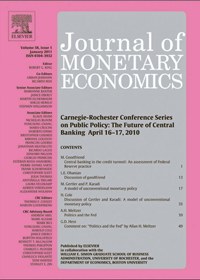
Caballero, D., Lucas, A., Schwaab, B. and Zhang, X. (2020). Risk endogeneity at the lender/investor-of-last-resort Journal of Monetary Economics, 116:283--297.
-
Affiliated authorsAndre Lucas, Bernd Schwaab
-
Publication year2020
-
JournalJournal of Monetary Economics
To what extent can a central bank influence its own balance sheet credit risks during a financial crisis through unconventional monetary policy operations? To study this question we develop a risk measurement framework to infer the time-variation in portfolio credit risks at a high (weekly) frequency. Focusing on the Eurosystem's experience during the euro area sovereign debt crisis between 2010 and 2012, we find that the announcement and implementation of unconventional monetary policy operations generated beneficial risk spill-overs across policy portfolios. This caused overall risk to be nonlinear in exposures. In some instances the Eurosystem reduced its overall balance sheet credit risk by doing more, in line with Bagehot's well-known assertion that occasionally “only the brave plan is the safe plan.”